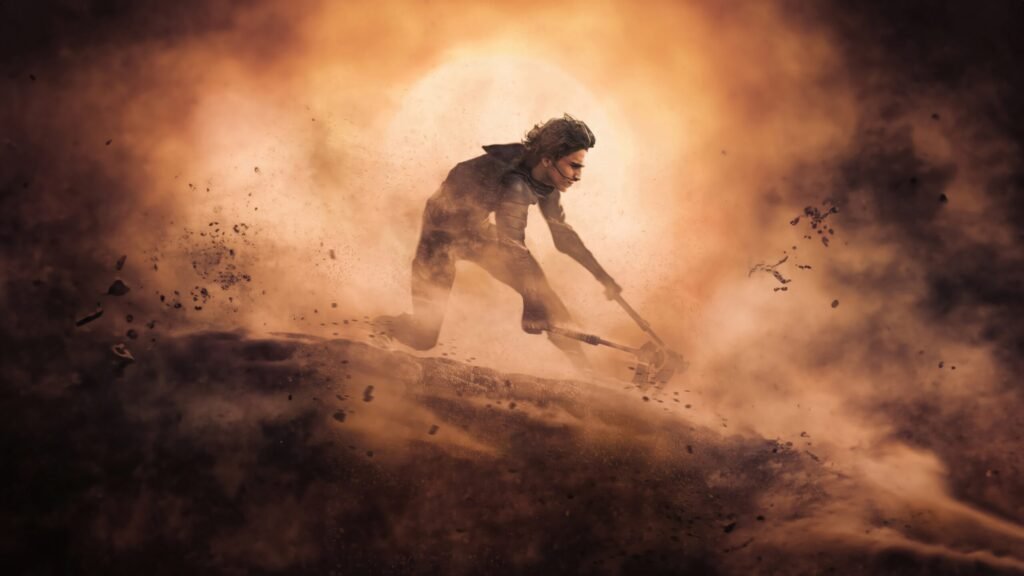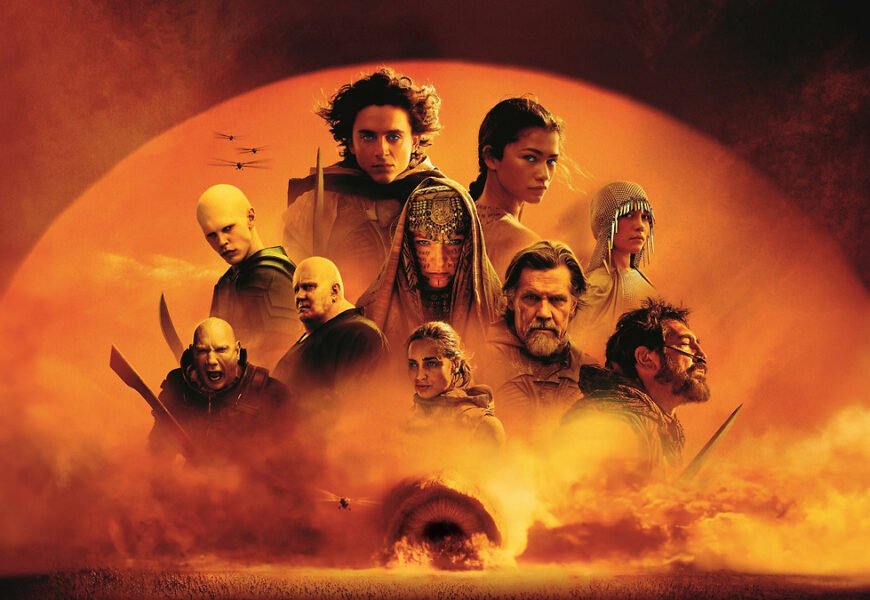“I had no idea something this big could feel this intimate.”
It was a quiet line on Reddit. Buried beneath hundreds of fire emojis and praise for the sandworm scenes. But it lingered.
One year since its release, Dune: Part Two hasn’t faded. If anything, it’s growing. Rewatched obsessively, dissected on podcasts, held up as the rare blockbuster that left people thinking, and feeling, long after the credits rolled.
So the question persists: Is it the best science fiction film ever made?
A bold claim. But to even ask it seriously is already a kind of answer. Because in a cinematic era dominated by tired formulas and corporate algorithms, the fact that Dune: Part Two even exists, let alone triumphs, feels like a miracle.
Not Just Spectacle, But Substance
Science fiction has always wrestled with duality. It’s the genre of vastness and intimacy, outer space and inner struggle. But for decades, mainstream sci-fi cinema has leaned into the former at the expense of the latter. CGI universes, intergalactic wars, and increasingly weightless storytelling.
Dune: Part Two resists that drift.
Yes, it’s a visual epic. The scale is operatic. But at its core is a story about grief, destiny, power, and the weight of choice. Paul Atreides doesn’t just fight battles; he absorbs the costs. He doubts. He suffers. He changes.

Denis Villeneuve’s direction is not just confident, it’s deeply intentional. The decision to drop music from key scenes (including an almost unbearable moment of emotional rupture) shows a trust in silence and the audience. It’s filmmaking that respects intelligence. That asks for patience.
And it rewards it.
The Long Arc of Worldbuilding
It’s tempting to say Dune was always destined for this. After all, Frank Herbert’s original novel has long been held up as one of sci-fi’s most complex texts. Dense, philosophical, political, and ecological. But adaptation is rarely so straightforward.
What Villeneuve has accomplished is less a translation and more a transformation. He doesn’t merely reproduce Herbert’s world—he renders it real. The texture of the desert, the subtlety of the Fremen rituals, and the way characters move in space that feels lived-in rather than staged. All of it builds not just a world, but a belief in that world.
And that belief is crucial. Because without it, the emotional stakes of the story would collapse under the weight of its lore.
Instead, the lore lifts the emotion.
That’s rare.
The Performances: Human First, Heroic Second
Timothée Chalamet’s performance as Paul deserves more attention than it’s gotten. It’s not flashy. It’s not even particularly likable. But it’s real. His Paul is cold, uncertain, and crucially, believable. He doesn’t leap into messianic confidence; he slips into it, almost against his will.
Zendaya, who many felt was underused in Part One, is central here, not just in screen time, but in moral gravity. Her Chani is not a supporting role. She is the film’s conscience, its counterweight, its question mark.
And Austin Butler’s Feyd-Rautha? Terrifying, yes. But not cartoonish. His menace is surgical. Stripped of Marvel-style quips or caricature, he becomes something harder to place, and more disturbing for it.
These characters aren’t just players in a grand plot. They’re people, shaped by belief systems, traumas, and desires. Dune: Part Two asks its actors to inhabit ambiguity, and they do.
Cinema in the Age of Risk Aversion
Context matters.
In early 2024, Dune: Part Two premiered just weeks after Madame Web, a film that became shorthand for everything wrong with modern Hollywood. Rushed, shallow, cynical.
By contrast, Dune felt dangerous. Not in its content, but in its commitment. To tone. To pace. To scale. To a story that unfolds like literature, not marketing.
Villeneuve took risks. Warner Bros. let him. And audiences followed.
It’s a reminder that blockbusters can be art. That artistry and commercial success aren’t mutually exclusive. That, sometimes, trusting your audience is the best strategy.
A Different Kind of Marketing War
And yet, Dune: Part Two wasn’t an underdog.
Its success wasn’t accidental. Its marketing was both grand and subtle. On TikTok, behind-the-scenes glimpses weren’t just PR, they became their kind of storytelling. The cast wasn’t selling products; they were extending the film’s world, making it personal.
The result? Sustained engagement. A sense of ownership among fans. Memes, yes, but also thinkpieces. Reels and reactions, but also real conversation.
This blend of epic production and grassroots marketing may mark a new blueprint. For once, the hype matched the depth.
Reframing the Canon
So, is Dune: Part Two the greatest sci-fi film ever made?
That depends on what we mean by “greatest.” If we’re talking cultural impact, Star Wars still reigns. If we mean speculative boldness, 2001: A Space Odyssey set the bar. Emotional resonance? Arrival or Children of Men might come to mind.
But Dune does something none of these quite did.
It dares to be a blockbuster that’s slow. A spectacle that whispers. A franchise film where the most powerful moment might be a silence between two people, not a fight.
In that way, it doesn’t just compete with the greats—it redefines what greatness in sci-fi could look like in the 21st century.
Looking Forward
The trilogy’s conclusion is still to come. And history is rarely written halfway through a story.
But what Dune: Part Two has already proven is this: ambition still matters. Audiences will show up for nuance. And science fiction, when done right, can reflect not just the future, but our deepest truths about now.
Sources:
- Frank Herbert’s Dune – Encyclopedia Britannica
- Box Office Mojo – Dune: Part Two
- Villeneuve Interview – Variety
- Reddit Discussion Thread
- TikTok Strategy – Social Media Today
- The Atlantic – On Modern Blockbuster Cinema














